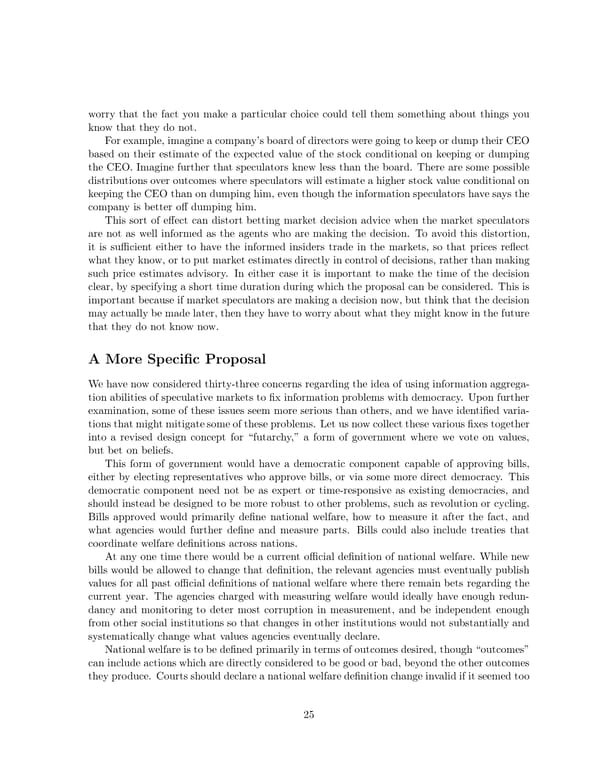worry that the fact you make a particular choice could tell them something about things you know that they do not. For example, imagine a company’s board of directors were going to keep or dump their CEO based on their estimate of the expected value of the stock conditional on keeping or dumping the CEO. Imagine further that speculators knew less than the board. There are some possible distributions over outcomes where speculators will estimate a higher stock value conditional on keeping the CEO than on dumping him, even though the information speculators have says the company is better off dumping him. This sort of effect can distort betting market decision advice when the market speculators are not as well informed as the agents who are making the decision. To avoid this distortion, it is sufficient either to have the informed insiders trade in the markets, so that prices reflect whatthey know, or to put market estimates directly in control of decisions, rather than making such price estimates advisory. In either case it is important to make the time of the decision clear, by specifying a short time duration during which the proposal can be considered. This is important because if market speculators are making a decision now, but think that the decision mayactually be made later, then they have to worry about what they might know in the future that they do not know now. AMoreSpecific Proposal Wehavenowconsidered thirty-three concerns regarding the idea of using information aggrega- tion abilities of speculative markets to fix information problems with democracy. Upon further examination, some of these issues seem more serious than others, and we have identified varia- tions that might mitigatesome of these problems. Let us now collect these various fixes together into a revised design concept for “futarchy,” a form of government where we vote on values, but bet on beliefs. This form of government would have a democratic component capable of approving bills, either by electing representatives who approve bills, or via some more direct democracy. This democratic component need not be as expert or time-responsive as existing democracies, and should instead be designed to be more robust to other problems, such as revolution or cycling. Bills approved would primarily define national welfare, how to measure it after the fact, and what agencies would further define and measure parts. Bills could also include treaties that coordinate welfare definitions across nations. At any one time there would be a current official definition of national welfare. While new bills would be allowed to change that definition, the relevant agencies must eventually publish values for all past official definitions of national welfare where there remain bets regarding the current year. The agencies charged with measuring welfare would ideally have enough redun- dancy and monitoring to deter most corruption in measurement, and be independent enough from other social institutions so that changes in other institutions would not substantially and systematically change what values agencies eventually declare. Nationalwelfare is to be defined primarily in terms of outcomes desired, though “outcomes” can include actions which are directly considered to be good or bad, beyond the other outcomes they produce. Courts should declare a national welfare definition change invalid if it seemed too 25
 Shall We Vote on Values, But Bet on Beliefs? Page 26 Page 28
Shall We Vote on Values, But Bet on Beliefs? Page 26 Page 28